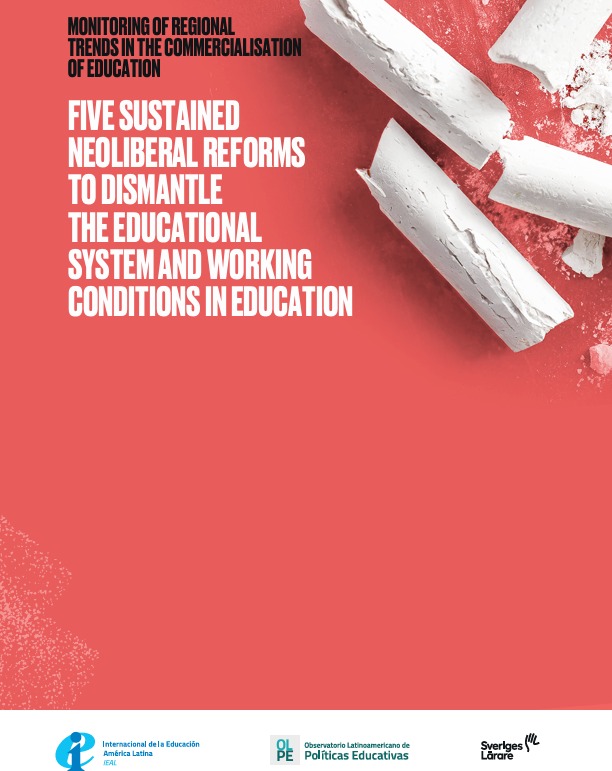
MONITORING OF REGIONAL TRENDS IN THE COMMERCIALISATION OF EDUCATION
FIVE SUSTAINED NEOLIBERAL REFORMS TO DISMANTLE THE EDUCATIONAL SYSTEM AND WORKING CONDITIONS IN EDUCATION
Colaboradores:
Internacional de la Educación para América Latina (Coordinación editorial de)
Toner, Lucy (Traducido porv)
Editorial:Internacional de la Educación para América Latina
Materia:CIENCIAS SOCIALES
Público objetivo:General
Publicado:2025-06-03
Número de edición:1
Tamaño:7.35Mb
Soporte:Digital
Formato:Pdf (.pdf)
Idioma:Inglés
Libros relacionados
CINCO REFORMAS PERMANENTES DO NEOLIBERALISMO PARA DESMANTELAR O SISTEMA EDUCACIONAL E AS CONDIÇÕES DE TRABALHO EM EDUCAÇÃO - Bonilla Pacheco, Gabriela
CINCO REFORMAS PERMANENTES DO NEOLIBERALISMO PARA DESMANTELAR O SISTEMA EDUCACIONAL E AS CONDIÇÕES DE TRABALHO EM EDUCAÇÃO - Bonilla Pacheco, Gabriela
El régimen municipal costarricense a inicios del siglo XXI - Alfaro Redondo, Ronald
Perfil de las personas usuarias de dispositivos de vapeo, según factores racionales y emocionales que motivan el consumo de este tipo de sustancias psicoactivas - Instituto sobre alcoholismo y Farmacodependencia; Chacón Serrano, William; Salas Durán, Silvia
Reseña
The Latin American Observatory of Educational Policies (OLPE), part of the Education International Latin America (EILA), presents this document addressing the main characteristics of the processes of transformation of Latin American educational systems.
Previous country-by-country studies undertaken by OLPE identified the privatisation of public education systems and the increasing opening of these to commercialisation as the major tendencies.
Recent decades have clearly evidenced links between Latin American governments and the private sector with the aim of deteriorating this latter, along with working conditions for public employees. The objective of this is to turn education into a business, using public resources for private profit.
This tendency has been strengthened by the encouragement of international financial institutions such as the World Bank (WB), which for decades have promoted the privatisation of education in Latin America. Another body that has more recently become a protagonist in the discussion on educational policy is the Organization for Economic Cooperation and Development (OECD), which defines the direction of public education systems in similar terms to those proposed by the World Bank.
Currently the strategies employed by these organisations over decades can be predicted to deepen with the promotion of virtual education and the incorporation of artificial intelligence.
This is added to the particular interest of international institutions, governments and private sectors in leaving behind face-to-face encounters and pedagogical exchange in classrooms.
EILA Regional Office offers this analysis to education unions—in particular our affiliates—so that they can document what is happening in this period with respect to public education systems and relate this to the struggles that are taking place within the different countries in the region.
We hope that this document fulfils the objective of motivating organisations to think about the
need to focus their strategies on defining alternative proposals for educational and pedagogical public policy, and that these allow the strengthening of their political action in accordance with the principles of the Latin American Pedagogical Movement, such that they can resist threats to the right to education.




